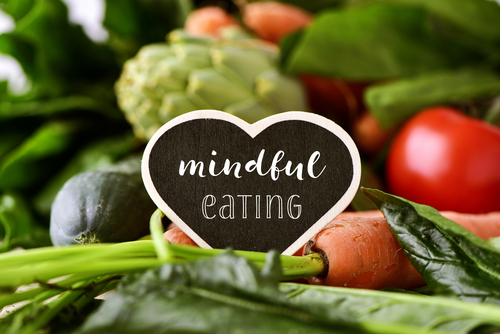Last Updated on April 11, 2024 by Silvy
Mindful Eating Habits for Weight Management: Ditch the Diets, Embrace Awareness
Dieting. It’s a word that conjures up images of restriction, deprivation, and maybe even a tinge of desperation.
But what if there was a better way to manage your weight? A way that focuses on awareness, enjoyment, and developing a healthy relationship with food? Enter mindful eating.
Mindful eating isn’t a fad diet; it’s a lifestyle shift that can help you achieve sustainable weight management and a happier, healthier you.
Let’s ditch the calorie counting and explore the power of mindful eating habits for weight management.

Why Mindful Eating?
We all know the feeling – mindlessly munching on chips while watching TV, scarfing down lunch at our desks, or grazing all day long without ever feeling truly satisfied.
These autopilot eating habits can lead to overeating and unhealthy food choices, ultimately hindering weight management efforts.
Mindful eating, on the other hand, teaches you to tune into your body’s hunger and fullness cues.
It’s about slowing down, savoring your food, and making conscious choices about what you eat. By becoming more mindful of your eating habits, you can:
- Gain control over your portions: Mindful eating helps you recognize true hunger and stop eating when you’re comfortably full, preventing overeating.
- Make healthier food choices: When you pay attention to your body’s signals and focus on the sensory experience of eating, you’re more likely to crave and choose nutritious foods.
- Reduce stress-related eating: Mindful eating techniques can help manage stress, a common trigger for emotional eating.
- Develop a positive relationship with food: Mindful eating fosters a sense of peace and appreciation around food, taking the guilt and shame out of the equation.
Cultivating Mindful Eating Habits
Ready to embark on your mindful eating journey? Here are some practical tips to get you started:
Tune into Your Body’s Hunger Cues
Before reaching for food, ask yourself: “Am I truly hungry?” Hunger pangs, stomach growling, and feeling lightheaded are all signs your body needs fuel.
However, reaching for food out of boredom, stress, or social pressure isn’t true hunger.
Slow Down and Savor
In our fast-paced world, we often eat on the go, barely registering the taste or texture of our food. Mindful eating encourages slowing down.
Sit down at a table, turn off distractions like phones or TVs, and focus on your meal. Take small bites, chew thoroughly, and savor the flavors and textures of each mouthful.
Embrace Your Senses
Food is a multi-sensory experience. Notice the vibrant colors of your salad, the aroma of freshly baked bread, the satisfying crunch of a carrot.
Engage all your senses to fully appreciate your food.
Put Down Your Utensils Between Bites
This simple practice helps you slow down your eating pace and allows your body to register feelings of fullness.

Be Present in the Moment
Focus on the act of eating, rather than letting your mind wander. Mindful eating is about appreciating the experience of nourishing your body.
Listen to Your Fullness Cues
Your body sends signals when it’s had enough. Learn to recognize these cues – feeling comfortably full, a decrease in appetite, or a slight tightness in your stomach.
Stop eating before you reach the point of feeling stuffed.
Make Peace with Food
There are no “good” or “bad” foods in mindful eating. All foods can be enjoyed in moderation. Give yourself permission to indulge in treats occasionally, but do so mindfully.

Challenge Negative Thoughts
Negative self-talk about food choices can hinder your progress. Instead of labeling yourself as “bad” for having a slice of cake, practice self-compassion.
Remember, mindful eating is a journey, not a destination.
Practice Gratitude
Take a moment to appreciate the food on your plate – the farmers who grew it, the people who prepared it, and your body for being able to nourish itself.
Remember, mindful eating is a skill that takes practice. Be patient with yourself, and celebrate your progress along the way.
With consistent effort, mindful eating habits can become an integral part of your weight management journey and lead to a healthier, happier you.
Here are some additional FAQs to address common questions about mindful eating
Is mindful eating the same as intuitive eating?
Mindful eating and intuitive eating share some similarities, but they’re not exactly the same. Mindful eating is a foundation for intuitive eating. It focuses on developing the awareness and skills to make conscious choices about food based on your body’s needs. Intuitive eating goes a step further and encourages you to trust your body’s wisdom to guide your food choices. It includes principles like rejecting the diet mentality, honoring your hunger and fullness cues, and making peace with food.
Will mindful eating help me lose weight?
While weight loss isn’t the primary goal of mindful eating, it can be a positive side effect. By becoming more aware of your hunger and fullness cues, you’re likely to eat less and make healthier choices, which can lead to weight loss. However, mindful eating is more about developing a healthy relationship with food and fostering long-term well-being.
Do I need a special diet to practice mindful eating?
Absolutely not! Mindful eating can be incorporated into any diet. The focus is on how you approach your meals, not what you eat.
What if I struggle with emotional eating?
Mindful eating can be a powerful tool for managing emotional eating. By becoming more aware of your emotions and how they influence your eating habits, you can learn to cope with stress and difficult feelings in healthier ways, rather than turning to food for comfort.
Are there any resources available to help me learn more about mindful eating?
Yes! There are many excellent resources available to support you on your mindful eating journey. Here are a few suggestions:
- Websites: The Center for Mindful Eating (https://www.thecenterformindfuleating.org/), Intuitive Eating (https://www.intuitiveeating.org/)
- Books: “Mindful Eating” by Marc David “Intuitive Eating” by Evelyn Tribole and Elyse Resch
- Apps: Headspace, Insight Timer (these apps offer guided meditations specifically for mindful eating)
Remember, mindful eating is a personal journey. Find what works best for you and be kind to yourself along the way.
By cultivating mindful eating habits, you can not only manage your weight but also build a healthier and more fulfilling relationship with food.
Verified Sources:


